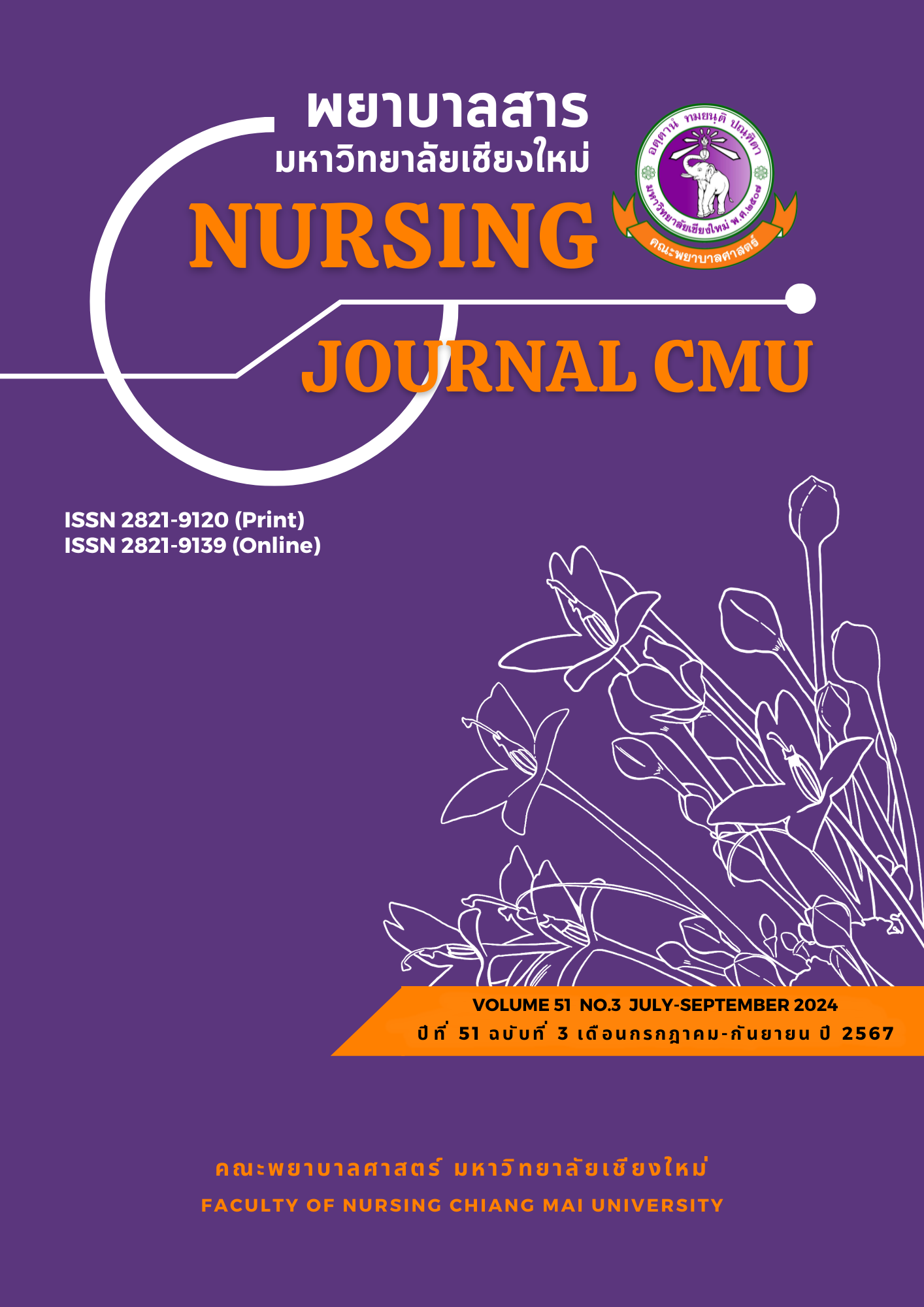Effect of a Food Literacy Enhancing Program on Dietary Behaviors Among Groups at Risk of Hypertension in Communities
Keywords:
Food literacy, Dietary behaviors, High-risk group for hypertensionAbstract
Enhancing effective food literacy on dietary behaviors among groups at risk for hypertension is important for leading to improved health for people. This quasi-experimental research study, with a two-group pretest-posttest design, aimed to compare food consumption behavior scores for an experimental group, before and after receiving a food literacy enhancing program, and to compare the food consumption behavior scores between the experimental and control groups after they had undergone the program for a period of 8 weeks. The participants consisted of adults aged 35-59 years who were identified as being at risk for hypertension. A total of 48 participants were selected, and divided evenly into 24 for the experimental group and 24 for the control group. Research tools included 1) a program for enhancing food literacy, based on the health literacy framework of Nutbeam combined with food literacy from Fingland et al.; 2) a manual on food literacy for those at risk of hypertension in the community; 3) video media; and 4) a food consumption log. Data collection tools were comprised of a general information questionnaire and a food consumption behavior questionnaire. The content validity index of the tools was .97, and the reliability, as measured by Cronbach’s alpha coefficient, was .84. Data was analyzed using descriptive statistics, Wilcoxon signed-rank test, and Mann-Whitney U test.
The findings revealed that the experimental group had a higher mean score for food consumption behavior (M = 4.12, SD = 0.17) than before receiving the program (M = 3.40, SD = 0.21). Their score was also significantly higher than that of the control group (M = 3.37, SD = 0.18), with statistical significance (p < 0.001).
The study results showed that the food literacy enhancing program could be effectively used as a guideline to modify food consumption behaviors among groups at risk of hypertension in communities.
References
Arahung, R., Hoontrakul, S., & Roojanavech, S. (2018). The effects of health literacy enhancement program on hypertensive prevention behavior of pre-hypertension risk group at a community in Nakhon Pathom Province. Royal Thai Navy Medical Journal, 45(3), 509-526. (in Thai)
Begley, A., Paynter, E., Butcher, L. M., & Dhaliwal, S. S. (2019). Effectiveness of an adult food literacy program. Nutrients, 11(4), 797. https://doi.org/10.3390/nu11040797
Buapradit, A., & Saokaew, S. (2020). Effects of the program for media literacy in advertising on consumption behavior of health products among elderlies using line application in Nakhon Nayok. Thai Journal of Pharmacy Practice, 12(4), 932-942. (in Thai)
Charoenwongsa, K., Wirojratana, V., & Wattanakitkrileart, D. (2022). The effect of a medication adherence promotion program through the line application on older persons with essential hypertension. Nursing Journal CMU, 49(2), 313-325. (in Thai)
Codrington, S., Panuthai, S., & Khampolsiri, T. (2021). Health literacy and self-management among elderly monks with hypertension. Nursing Journal, 48(4), 268-280. (in Thai)
Dejpitaksirikul, S., Sinthuchai, S., & Ubolyam, D. (2022). Effective communication to enhance health literacy in diabetic older adults with high blood pressure. Nursing Journal of the Ministry of Public Health, 32(1), 1-13. (in Thai)
Fingland, D., Thompson, C., & Vidgen, H. A. (2021). Measuring food literacy: Progressing the development of an international food literacy survey using a content validity study. International Journal of Environmental Research and Public Health, 18(3), 1141. https://doi.org/10.3390/ijerph18031141
Health Education Division. (2015). Guidelines for promoting health literacy and developing health behaviors in health management subdistrict. http://www.hed.go.th
Kaew-in, D., Chaimadee, T., Siriprayoonsak, M., Donghong, K., Namuangrak, W., & Promtet, T. (2019). Consumer’s behavior of decision-making in consuming Northeastern food in Mueang Udon Thani Municipality, Udon Thani. Journal of That Phanom Review, 3(2), 207-223. (in Thai)
Manmee, C., Niramitmahapanya, S., Sickamann, O., & Srithong, H. (2021). Development of nutrition knowledge-based learning model by information technology for blood sugar control among diabetic patients. Journal of the Department of Medical Services, 46(1), 52-63. (in Thai)
Ministry of Public Health. (2019). NCD annual_report2019. https://ddc.moph.go.th/uploads/publish/1035820201005073556.pdf
Ministry of Public Health. (2020). NCD annual_report2020. Ministry of Public Health.
Ministry of Public Health. (2021). Statistical information of the Sakon Nakhon Provincial Public Health Office, Health District 8. https://hdcservice.moph.go.th/hdc/main/index.php
Nutbeam, D. (2008). The evolving concept of health literacy. Social Science & Medicine, 67(12), 2072-2078.
Ruangchai, K., & Uttarachai, A. (2020). Physical activity and food consumption affect to health status in worker at Khlong Luang, Pathum Thani. Research and Development Health System Journal, 13(1), 354-359. (in Thai)
Sookpool, A., Kingmala, C., Pangsuk, P., Yeanyoun, T., & Wongmun, W. (2020). Effectiveness of health literacy and health behavior development program for working people. Journal of Health Science, 29(3), 420-429. (in Thai)
Thai Hypertension Society. (2019). 2019 Thai guidelines on the treatment of hypertension. http://www.thaihypertension.org/files/442.HT%20guideline%202019.with%20watermark.pdf (in Thai)
Thongkao, S., Kimsungnoen, N., & Namjuntra, R., (2021). Effects of educative-supportive program on self-care behaviors and blood pressure levels among young adult patients with uncontrolled hypertension. Thai Journal of Cardio-Thoracic Nursing, 32(2), 73-87. (in Thai)
Thongma, P. (2020). Health literacy and health outcomes in hypertensive patients. Thai Red Cross Nursing Journal, 13(1), 50-62. https://he02.tci-thaijo.org/index.php/trcnj/article/view/243809/165725 (in Thai)
Visedkaew, K., & Muktabhant, B. (2020). Association between nutrition literacy and the consumption of snacks and sweetened beverages among undergraduate students in the health sciences faculties of Khon Kaen University. Srinagarind Medical Journal, 35(2), 183-192. (in Thai)
World Health Organization. (1998). Health promoting glossary. https://www.who.int/publications/i/item/WHO-HPR-HEP-98.1
Yod-on, T., & Nuysr, M. (2020). The effects of behavioral modification in food consumption program in uncontrolled hypertension patients, Nongmamong District, Chainat Province. Research and Development Health System Journal, 13(2), 388-399. https://he02.tci-thaijo.org/index.php/RDHSJ/article/view/255099/173300 (in Thai)
Youngiam, W., & Abdullakasim, P. (2021). Effects of the “I See Right Sodium” program on sodium consumption behavior among university students in Lower Northern Region, Thailand. [Doctoral dissertation, Burapha University]. https://digital_collect.lib.buu.ac.th/dcms/files/61810007.pdf
Downloads
Published
How to Cite
Issue
Section
License
Copyright (c) 2024 Nursing Journal CMU

This work is licensed under a Creative Commons Attribution-NonCommercial-NoDerivatives 4.0 International License.
บทความที่ได้รับการตีพิมพ์เป็นลิขสิทธิ์ของวารสารพยาบาลสาร
ข้อความที่ปรากฏในบทความแต่ละเรื่องในวารสารวิชาการเล่มนี้เป็นความคิดเห็นส่วนตัวของผู้เขียนแต่ละท่านไม่เกี่ยวข้องกับมหาวิทยาลัยเชียงใหม่ และคณาจารย์ท่านอื่นๆในมหาวิทยาลัยฯ แต่อย่างใด ความรับผิดชอบองค์ประกอบทั้งหมดของบทความแต่ละเรื่องเป็นของผู้เขียนแต่ละท่าน หากมีความผิดพลาดใด ๆ ผู้เขียนแต่ละท่านจะรับผิดชอบบทความของตนเองแต่ผู้เดียว






